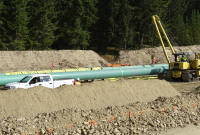Support strong Canadian climate journalism for 2025
OTTAWA — It would be against the law for Saskatchewan to run its coal-fired power plants after 2030 unless the greenhouse-gas emissions from those plants are captured, federal Environment Minister Steven Guilbeault said Wednesday.
His comment comes as electricity generation becomes the latest jurisdictional battle over climate policy between federal and provincial governments.
Canada's current climate plan aims for all electricity to be emissions-free by 2035, and regulations to enforce the target are expected later this year.
The draft policy published last year suggests that by 2035, all electricity will have to be clean — such as hydroelectricity, nuclear, wind or solar. Either that or the emissions will have to be abated somehow, such as with carbon capture and storage systems.
Under the proposal, some natural gas plants built before regulations are established would be able to operate after 2035 for an as-yet-undefined length of time.
But when it comes to coal plants, the federal rules are stricter. And they are already in place.
In 2018, Ottawa passed coal power regulations that mean all power plants that rely on coal must be closed, converted to natural gas or equipped with carbon-capture systems by the end of 2029.
Saskatchewan Premier Scott Moe said Tuesday his province can't meet the federal rules and keep the lights on at an affordable price. Instead he proposed a clean electricity target of 2050, 15 years later than what Ottawa wants.
And he said he expects his province will keep operating its three coal-plants until the end of their lifespans, which would see the first plant close three years after the 2030 phase-out date. The other two would extend beyond that date by 12 and 14 years.
Guilbeault said Wednesday that the coal regulations exist within the Canadian Environmental Protection Act and violating them would be illegal.
"We've regulated the ban on coal through CEPA, which is a criminal tool that the federal government has," he said. "So not complying with this regulation would be a violation of Canada's Criminal Code."
Moe said Tuesday that provinces have jurisdiction over electricity, so he was not anticipating a legal battle over his power-grid plan.
Guilbeault said the clean electricity regulations aren't finalized, so it is premature for Moe to insist his province can't meet them. He also said more and more companies are looking to make investments in places that have clean power.
German auto giant Volkswagen cited Ontario's abundant clean electricity as one of the reasons it opted to built a new electric-vehicle battery plant in that province, for example.
"If we want to be competitive in the in the 21st century economy, we have to decarbonize our grid," Guilbeault said.
"It's about jobs, not just for the next five or 10 years, but for the next 30, 40, 50 years. And of course, we want to do that in a way that is affordable for Canadians. We want to have a reliable grid.
"No one wants a situation where we flick off the switch and it's not working."
When it comes to climate policy, electricity has been one of Canada's biggest success stories.
Emissions from power generation have been cut by more than half between 2005 and 2021. They now account for less than eight per cent of Canada's total emissions.
Hydroelectricity provides almost two-thirds of Canada's total electricity now, and non-hydro renewables like wind and solar went from almost nothing in 2005 to six per cent of electricity generation in 2021.
But in Alberta and Saskatchewan, coal and gas remain a significant source of electricity.
The latest National Inventory Report says Alberta gets 30 per cent of its electricity from coal and 54 per cent from natural gas, while Saskatchewan gets 40 per cent from coal and 44 per cent from gas.
Alberta and Saskatchewan have challenged federal climate policies in court more than once, most notably over Ottawa's jurisdiction to impose a national minimum price on carbon pollution.
The Supreme Court of Canada ruled Ottawa had the authority to do that because climate change was a serious threat and emissions did not respect provincial borders.
This report by The Canadian Press was first published May 17, 2023.





Comments